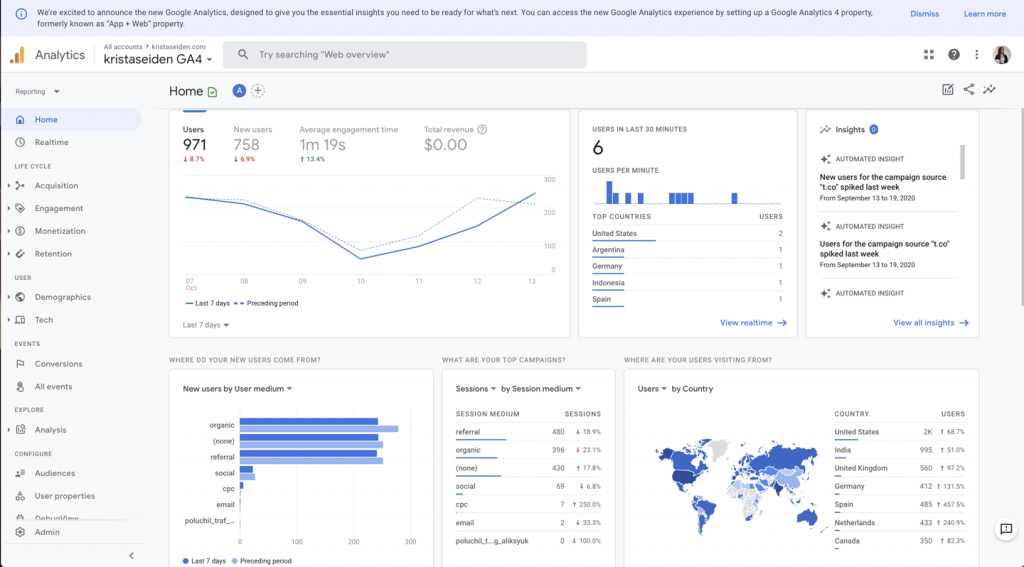The Effect of Google Analytics on Site Optimization and Performance Metrics
In the realm of digital marketing, the use of Google Analytics has ended up being synonymous with refining site performance and optimizing essential metrics. From tracking site visitor actions to evaluating web traffic sources, the impact of this robust tool extends much past simple data collection. By diving into the complexities of user interactions and content efficiency, Google Analytics empowers services to make enlightened choices that can boost their online existence. As we browse via the detailed internet of site optimization and performance metrics, the extensive impact of Google Analytics continues to shape the digital landscape, offering vital understandings that go beyond standard approaches.
Tracking Site Visitor Habits
Tracking site visitor actions is essential for understanding user engagement and optimizing site efficiency. By using devices like Google Analytics, web site owners can get valuable understandings into exactly how site visitors connect with their site. This information enables a much deeper understanding of user preferences, behaviors, and the efficiency of different web site elements.
Assessing site visitor actions gives important details on which pages are most prominent, the length of time individuals remain on the site, and where they often tend to hand over. With this information, internet site owners can make educated choices on web content placement, design enhancements, and overall individual experience enhancements.
In addition, tracking visitor habits allows the recognition of trends in time. By keeping an eye on metrics such as bounce rate, conversion price, and average session duration, site owners can examine the influence of adjustments made to the website and tailor techniques to much better involve site visitors.
Basically, tracking site visitor actions via tools like Google Analytics is not practically accumulating information but making use of that information to maximize internet site efficiency, boost customer experience, and eventually attain business goals. - what data does google analytics prohibit collecting

Studying Website Traffic Resources
Assessing the sources of website traffic to a web site is vital for recognizing where visitors are coming from and how they are discovering the site. By making use of devices like Google Analytics, web site proprietors can acquire beneficial understandings right into the efficiency of their marketing initiatives and the behavior of their audience. The web traffic sources can be classified into numerous primary networks, including direct traffic (users who see the site directly), organic search (visitors that find the site via search engines), reference website traffic (customers directed to the site from external links), social media sites web traffic (site visitors from social systems), and paid advertising and marketing (customers that clicked paid ads)
Comprehending the distribution of traffic throughout these different channels enables internet site owners to make educated choices concerning their advertising methods. If a considerable section of traffic comes from organic search, focusing on search engine optimization (SEARCH ENGINE OPTIMIZATION) efforts might better enhance visibility. Alternatively, if social media networks drive minimal web traffic, reapportioning sources in the direction of even more worthwhile methods might be needed. By assessing traffic resources, internet site owners can optimize their marketing mix and enhance total internet site efficiency.
Enhancing Material Performance
To make best use of the influence of website content, maximizing its efficiency is important for attracting and engaging visitors effectively. By using Google Analytics, site owners can get important understandings into just how customers communicate with their content, consisting of which web pages are most gone to, how long site visitors stay on each page, and what activities they take after checking out the web content.
By analyzing this information, website proprietors can identify areas for renovation and make data-driven choices to improve the overall he has a good point performance of their material. By continually keeping track of and refining material efficiency based on understandings from Google Analytics, website owners can create a much more user-friendly and appealing experience for their target market.

Improving User Experience
Enhancing individual experience on a website is vital for fostering favorable communications and enhancing site visitor engagement. To enhance individual experience, web site proprietors can utilize Google Analytics to gain valuable insights right into user habits.
Google Analytics additionally provides information on gadget usage, allowing web site owners to enhance for numerous screen dimensions and tools, making sure a seamless experience throughout systems. By tracking customer flow and habits, businesses can make educated choices to enhance the general web site experience. In addition, A/B screening features in Google Analytics make it possible for website owners to try out different formats, web content variations, and contacts us to activity to identify what resonates best with users. Ultimately, by leveraging Google Analytics insights to boost individual experience, sites can raise interaction, drive conversions, and ultimately accomplish their organization objectives.
Enhancing Conversions
By leveraging data-driven understandings from Google Analytics, internet site proprietors can dramatically improve their methods to improve conversion rates successfully. Comprehending individual behavior through metrics such as conversion funnels, objective completions, and shopping monitoring enables companies to pinpoint locations for enhancement. A/B testing various aspects on a page, such as call-to-action buttons or form designs, based upon information from Google Analytics can result in significant boosts in conversion rates.
Moreover, utilizing Google Analytics to assess web traffic resources can assist businesses designate resources properly (what data does google analytics prohibit collecting). By determining which networks drive the most conversions, whether it's natural search, paid marketing, or social media, business can optimize their advertising and marketing efforts for optimal effect
Moreover, tracking customer engagement metrics like bounce price, average session period, and pages per session can offer beneficial insights into how site visitors engage with an internet site. By improving these metrics with data-driven approaches, companies can More Bonuses develop a more engaging user experience that inevitably results in greater conversion prices.
Conclusion
Finally, Google Analytics plays an essential function in maximizing site efficiency by tracking site visitor behavior, assessing traffic sources, improving material efficiency, improving individual experience, and boosting conversions. By using the information given by this tool, site owners can make educated choices to improve their general online existence and attain their objectives. It is essential for services to take advantage of Google Analytics to constantly check and adjust their approaches for maximum performance.
By examining traffic resources, internet site owners can optimize their advertising mix and enhance general web site efficiency.
By using Google Analytics, web site proprietors can obtain valuable insights into how users interact with their content, including which web pages are most visited, how long site visitors remain on each web page, and what activities they take after checking out the material. (what data does google analytics prohibit collecting)
To boost user experience, website owners can make use of Google Analytics to get useful insights into Continued customer actions. Furthermore, A/B testing features in Google Analytics enable web site owners to experiment with different formats, material variations, and calls to action to determine what reverberates ideal with individuals.In verdict, Google Analytics plays an essential function in maximizing web site efficiency by tracking visitor behavior, evaluating web traffic resources, boosting material efficiency, improving user experience, and enhancing conversions.